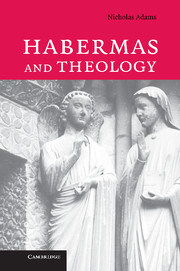Book contents
- Frontmatter
- Contents
- Preface
- 1 Religion in public
- 2 The ideal speech situation
- 3 Authority and distance in tradition
- 4 Sacred and profane
- 5 Universalism
- 6 Theology and political theory
- 7 Theology, social theory and rationalisation
- 8 Modernity's triumph over theology
- 9 Habermas in dialogue with theologians
- 10 Narrative and argument
- 11 Scriptural difference and scriptural reasoning
- List of references
- Index
9 - Habermas in dialogue with theologians
Published online by Cambridge University Press: 23 December 2009
- Frontmatter
- Contents
- Preface
- 1 Religion in public
- 2 The ideal speech situation
- 3 Authority and distance in tradition
- 4 Sacred and profane
- 5 Universalism
- 6 Theology and political theory
- 7 Theology, social theory and rationalisation
- 8 Modernity's triumph over theology
- 9 Habermas in dialogue with theologians
- 10 Narrative and argument
- 11 Scriptural difference and scriptural reasoning
- List of references
- Index
Summary
This chapter illustrates some of the issues that arise when theologians try to make use of or engage with Habermas. It is not designed as a comprehensive account of theologians' engagements with him, or of his replies to his theological critics. The theological literature on Habermas is substantial, and although it continues to attract some interest in the English-speaking world, many of the German texts are untranslated. It is unnecessary to review the German literature here, as this has already been expertly and critically undertaken by Hermann Düringer in his thorough evaluation of Habermas' work. Düringer offers commentary on Helmut Peukert, Edmund Arens, Rudolf Siebert, Karl Bauer, Wolfgang Pauly, Wolfhart Pannenberg, Trutz Rendtorff, Henning Luther, Jens-Glebe Möller and Micha Brumlik. Düringer observes dryly that tracing all Habermas' direct and indirect influences on theology would be worth its own study. This is plainly unmanageable, given the extent to which Habermas' work permeates arguments about postmodernism. Düringer limits himself to the commentary given by German theologians on Habermas' work. The concern of this study is, however, not with the interaction between Habermas and theologians, but with his account of theology and with responding to some of the problems he raises concerning argumentation in the public sphere between members of different traditions. Nonetheless, Habermas does have a characteristic response to theological engagements with his work. This is worth rehearsing because I need to show that the criticisms and responses advanced in this study do not fall foul of Habermas' usual replies to theologians.
- Type
- Chapter
- Information
- Habermas and Theology , pp. 182 - 202Publisher: Cambridge University PressPrint publication year: 2006

